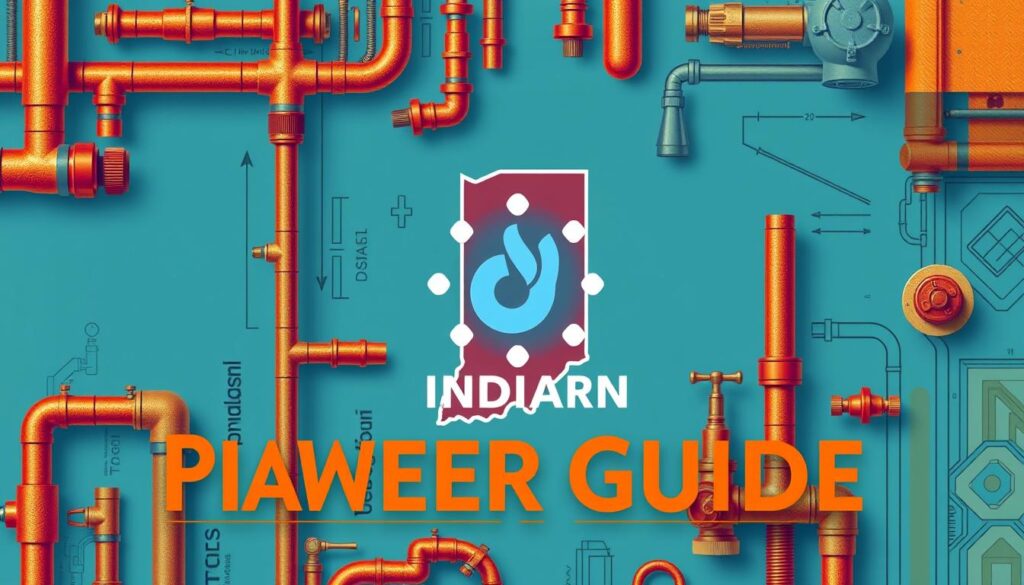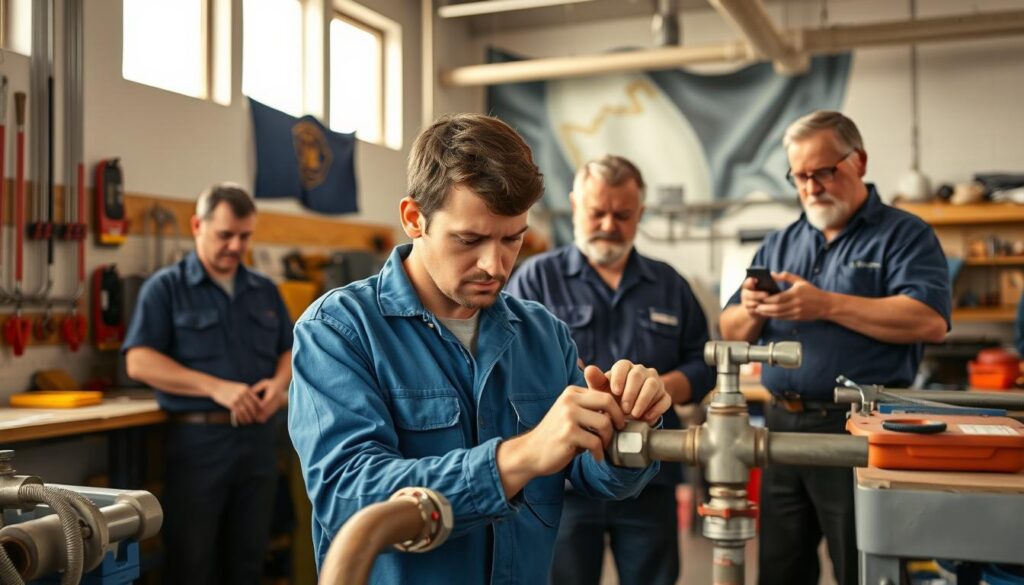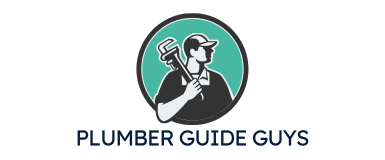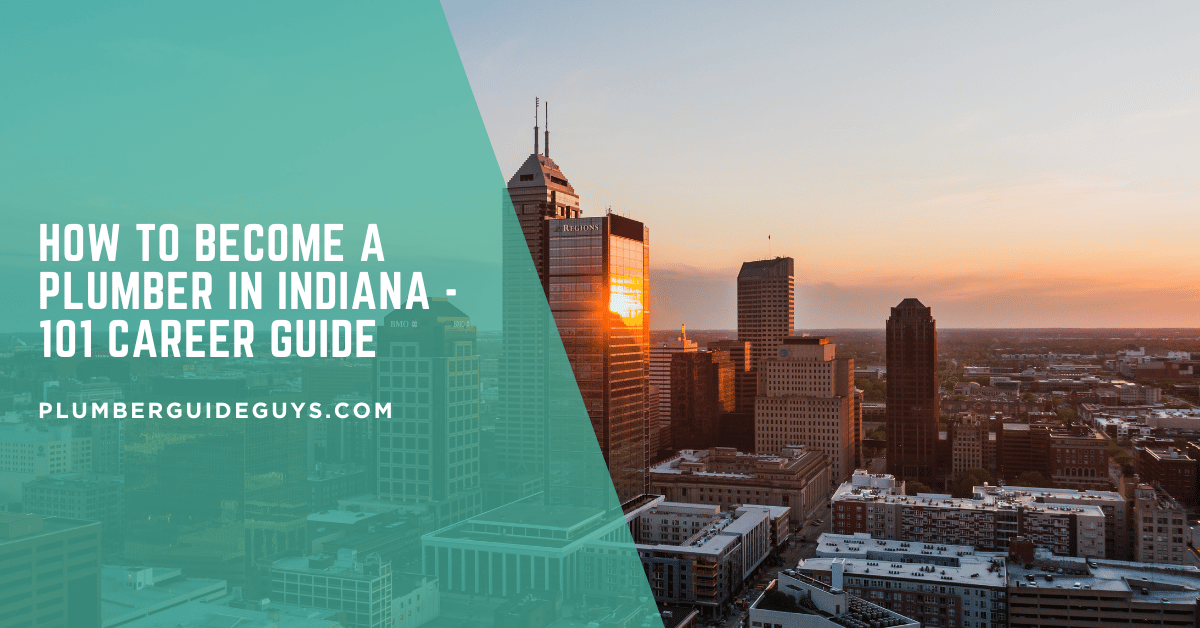How to Become a Plumber in Indiana? Are you ready to start a career that’s stable, pays well, and lets you solve real problems? Ever thought about becoming a plumber in Indiana?
Affiliate Disclosure
Plumber Guide Guys is a participant in the Amazon Services LLC Associates Program, an affiliate advertising program designed to provide a means for sites to earn advertising fees by advertising and linking to Amazon.

Becoming a plumber in Indiana is exciting and within reach. With more jobs for skilled tradespeople, it’s a great chance for a fulfilling career. You’ll use your technical skills and solve problems hands-on.
Indiana’s plumber licensing rules might seem tough, but this guide will help you every step of the way. You’ll learn about education, apprenticeships, and more. It’s your roadmap to success in plumbing.
Key Takeaways
- Plumbing offers a stable and lucrative career path in Indiana
- Comprehensive training and licensing are essential for success
- Multiple pathways exist for entering the plumbing profession
- High demand for skilled plumbers creates excellent job opportunities
- Technical and soft skills are key for career growth
Table of Contents
Understanding the Plumbing Career Path in Indiana
Exploring a plumbing career in Indiana is exciting. It offers a stable and rewarding job for skilled people. The plumbing industry is key in Indiana’s economy, with many career paths to grow and develop.
Plumbing jobs in Indiana are promising and dynamic. The demand for skilled workers is always high. There are many ways to advance and specialize in your career.
Career Overview and Industry Outlook
The plumbing industry in Indiana is full of opportunities. Key points include:
- Stable job market with consistent demand
- Multiple career advancement paths
- Opportunities for specialization in residential and commercial sectors
Average Salary Expectations in Indiana
Salaries in plumbing vary by experience and specialization. Entry-level jobs start at good rates. There’s a lot of room for growth.
| Experience Level | Annual Salary Range |
|---|---|
| Apprentice | $30,000 – $40,000 |
| Journeyman | $45,000 – $65,000 |
| Master Plumber | $70,000 – $90,000 |
Job Growth and Market Demand
The plumbing career in Indiana is very promising. Plumbers’ jobs are expected to grow much faster than average.
“Skilled trades like plumbing offer stable careers with excellent earning and job security.” – Indiana Workforce Development
Having an indiana plumbing contractor license can lead to starting your own business. Or, you can move up in a big company.
- 21% projected job growth in the next decade
- Increasing demand for skilled plumbing professionals
- Opportunities in residential, commercial, and industrial sectors
If you love technical skills and solving problems, a plumbing career in Indiana is a great chance.
Indiana Plumbing License Requirements and Regulations
Getting a plumbing license in Indiana can be tricky. Each area in Indiana has its own rules. But, there are basic steps you must take to become a licensed plumber.
The indiana plumbing code is key for licensing and standards. To get a plumbing license, you must:
- Complete a four-year apprenticeship program
- Pass state-mandated licensing examinations
- Get proper certification from local municipalities
- Show you know a lot about plumbing systems
Different places in Indiana have their own rules for licenses. For example, big cities like Indianapolis might have stricter rules than small towns.
| Licensing Level | Experience Required | Examination |
|---|---|---|
| Apprentice Plumber | 0-2 years | Basic Skills Test |
| Journeyman Plumber | 4+ years | Comprehensive State Exam |
| Master Plumber | 7+ years | Advanced Professional Exam |
Getting a plumbing license takes hard work and knowing the indiana plumbing code. Keeping up with local rules is key for your career.
“Proper licensing is the cornerstone of a professional plumbing career in Indiana” – Indiana State Plumbing Board
Always check with your local government for the latest on licenses. Rules can change often.
How to Become a Plumber in Indiana
Starting a career as a plumber in Indiana needs careful planning and a commitment to learning. Your path to becoming a skilled plumber includes key steps that will guide your future in this vital trade.
Learning how to become a plumber in Indiana begins with knowing the educational and professional needs. Success comes from completing various training and certification stages.
Educational Prerequisites
To start your journeyman plumber training in Indiana, you need a strong educational base. Most employers and apprenticeship programs ask for:
- High school diploma or equivalent (GED)
- Minimum age of 18 years
- Basic math and algebra skills
- Physical fitness and good hand-eye coordination
Apprenticeship Requirements
The apprenticeship is a key part of becoming a plumber in Indiana. This detailed training lasts four years and includes:
- 144 hours of classroom instruction annually
- 2,000 hours of paid on-the-job training per year
- Technical skills development
- Safety protocol training
Licensing Process Steps
To finish your journeyman plumber training, you must follow Indiana’s licensing steps:
- Complete a state-approved apprenticeship program
- Pass the journeyman plumber examination
- Submit proof of work experience
- Pay required licensing fees
Remember, each county in Indiana might have different licensing rules. It’s important to check local requirements for aspiring plumbers.
Plumbing Apprenticeship Programs in Indiana

Starting a plumbing career in Indiana means finding the right apprenticeship programs. These programs give you the hands-on training and classroom lessons you need to become a skilled plumber.
Indiana has many ways to get indiana journeyman plumber training through apprenticeships:
- Union-sponsored apprenticeship programs
- Community college technical training
- Private contractor apprenticeships
- State-approved vocational school programs
Most apprenticeship programs in Indiana last:
- 4-5 years of training
- 144 classroom hours each year
- 2,000 paid on-the-job hours yearly
- Technical skills tests
When picking a plumbing apprenticeship, look at the program’s reputation, the instructors’ skills, and job placement chances. Your chosen program should mix learning theory and practical skills well.
Pro Tip: Research local plumbers’ unions and trade associations for the latest apprenticeship chances in Indiana.
Finishing these apprenticeships gets you ready for licensing exams. It also builds a strong base for a fulfilling plumbing career in Indiana.
Required Skills and Qualifications for Indiana Plumbers
To be a top plumber in Indiana, you need technical know-how, physical strength, and professional skills. The certification process in Indiana is tough. It covers many skills to ensure quality and safety.
Plumbers must have more than just basic skills. Knowing the Indiana plumbing code is key. It keeps standards high and makes workplaces safe.
Technical Skills Every Plumber Needs
- Advanced blueprint reading and interpretation
- Pipe system design and installation techniques
- Proficiency with specialized plumbing tools and equipment
- Knowledge of water pressure and drainage systems
- Understanding of electrical and mechanical systems integration
Physical and Personal Attributes
Being a plumber is tough. You need certain traits:
- Strong physical stamina and strength
- Excellent hand-eye coordination
- Comfort working in confined spaces
- Ability to lift heavy equipment
- Mechanical aptitude and problem-solving skills
Safety Certifications and Knowledge
| Certification Type | Required Skills | Importance |
|---|---|---|
| OSHA Safety Training | Workplace hazard recognition | Critical for job site safety |
| First Aid/CPR | Emergency response techniques | Essential for workplace preparedness |
| Confined Space Entry | Safety protocols in restricted areas | Mandatory for complex installations |
Learning these skills makes you a strong plumber in Indiana’s fast-paced industry.
Indiana Plumbing Code and Compliance Standards
Knowing the Indiana plumbing code is key for plumbers. It helps them keep up with high work standards and meet licensing needs. The state’s rules ensure plumbing is safe and works well in homes and businesses.
The Indiana Plumbing Code covers important areas for plumbers:
- Detailed technical specs for plumbing systems
- Safety rules for water and drainage
- What materials pipes and fixtures should be made of
- How to install plumbing in different settings
Local areas might have extra rules on top of the state’s code. Plumbers need to keep up with these to keep their licenses and do safe work.
Important areas for compliance include:
- Choosing the right pipe size and material
- Installing pipes correctly
- Having good ventilation systems
- Using backflow prevention
Staying updated through education is vital. It helps plumbers keep up with new standards and stay certified in Indiana’s plumbing field.
Career Advancement and Specialization Opportunities
In Indiana, you can grow your plumbing career in many ways. Moving up from a beginner to a master plumber takes hard work, learning, and improving your skills.
Here are some ways to move forward in your plumbing career:
- Pursue an indiana plumbing contractor license
- Specialize in advanced plumbing systems
- Develop expertise in commercial or industrial plumbing
- Explore niche markets like medical gas systems
Choosing a special area can really help your career. Some good choices include:
| Specialization Area | Potential Benefits |
|---|---|
| Medical Gas Systems | Higher pay, specialized certifications |
| Water Treatment | Growing environmental market demand |
| Green Plumbing Technologies | Emerging sustainable solutions |
To become a master plumber indiana, you need to:
- Complete required apprenticeship hours
- Pass detailed licensing exams
- Keep up with professional education
- Get lots of experience in the field
Working hard to improve your skills can turn your plumbing job into a respected and well-paid career.
Business Insurance and Legal Requirements
Starting a plumbing business in Indiana means you must focus on legal and financial safety. As a plumber, you’ll need to meet insurance and regulatory needs. This ensures your business runs well and legally.

Protecting your plumbing business is more than just knowing how to fix pipes. Getting an indiana plumbing contractor license comes with legal duties. You’ll need to have the right insurance to cover these responsibilities.
Essential Insurance Coverage Types
- General Liability Insurance
- Professional Liability Coverage
- Workers’ Compensation Insurance
- Commercial Vehicle Insurance
- Tools and Equipment Insurance
Bonding Requirements for Plumbers
In Indiana, plumbers must get certain bonds to legally operate. The certification process in Indiana often requires showing financial stability with surety bonds.
| Bond Type | Minimum Coverage | Purpose |
|---|---|---|
| Contractor License Bond | $10,000 | Ensures compliance with state regulations |
| Performance Bond | Project-specific | Protects clients against incomplete work |
Business Registration Process
Registering your plumbing business involves several key steps:
- Choose a business structure
- Register with Indiana Secretary of State
- Obtain an Employer Identification Number (EIN)
- Apply for necessary plumbing permits
- Complete required insurance and bonding
Pro tip: Consult with a local business attorney to ensure full compliance with Indiana’s specific plumbing business regulations.
Conclusion
Starting your journey to become a plumber in Indiana is exciting and rewarding. This guide shows you how to turn your passion for skilled trades into a stable job. The plumbing industry in Indiana has many job opportunities, thanks to specialized training and licensing.
To become a plumber in Indiana, you need dedication, technical skills, and a love for learning. Plumbing schools in Indiana offer great programs. They give you the knowledge and hands-on experience needed to succeed.
There’s more to plumbing than just starting out. With the right training, you can move up to specialized roles, start your own business, or become a master plumber. Your skills will be in demand in many areas, making your career stable and potentially very rewarding.
Don’t wait to start. Look for plumbing schools near you, join professional groups, and find apprenticeships. Your plumbing career is waiting for you, with hard work and a commitment to learning.

